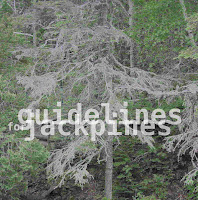Notes on poetry
It seems like there might be some use in comparing dreams and poetry. Or perhaps it would be more clear to compare the act of recovering or recording dreams and the act of writing poetry. (By poetry I mean simply art as she is written--well, maybe a bit more than that, too).
Is a poem like a dream? Does it function in the same way within our minds? When I say that, I mean that I think dreams function as a way of our mind's processing the stimuli of the day. It could almost be called a byproduct of the refining action the mind takes upon those stimuli. But when do we dream, when do we stop dreaming, and how do we know this? Is it possible that dreams are like the moon, nearly eclipsed by the light of the waking world, the increase of stimuli? Could poetry be like that ghostly light we see in the day's sky?
I don't mean is poetry like a "daydream." A daydream captures the conscious mind and brings it along. I mean to compare poetry to a dream--a dream, as we all know, is not understood completely, may not even be understandable, but is also deep and powerful. We understand, I think, that dreams contain within them the full range of our thoughts and emotions. This range may, in fact, be far fuller than we ever will feel in our normal conscious state except perhaps for rare moments.
But all this speculation is really only aiming toward one thought, presently. That is, however like or unlike dreams and poetry may be, what I am interested in at the moment is how they are recovered/accessed/stored by the conscious mind. We all know that there are only a tiny fraction of dreams that we will remember. We believe, perhaps from being conscious of the way in which we awake and almost always progressively forget our dreams, that there are many more dreams than those which we can remember. What if this is true of poetry? What if poetry is our constant waking companion, but we are in the almost constant act, on the one hand, of forgetting, and on the other, of ignoring its presence? What would this mean for us? To make a slight discursion, are we aware of how many of our words come to us in their present meaning purely via the forces of metaphor?
If poetry is our silent companion, and it acts, unobserved to us, in shaping the meaning and the understanding of the words and signs we use for communication--to share love, for intellectual commerce, for consolation, for ridicule--what would it mean to begin to take notice of this portion of the activity of our being? It seems like this could be developed into some sort of argument for the utility of the poetic. I won't attempt that, but I will come to my point: I have heard, and I think it is true, that those who, upon waking, immediately write down the dreams they had, will begin to become increasingly aware of and capable of remembering their dreams; I think this concept, however much it may or may not apply to dreams, is applicable to poetry. That is, to put it simply, I think that, as everyone has dreams (I suppose), everyone has poetry, and the point is simply that taking note and recording this activity of one's being begins the accumulation of new understanding.
Perhaps the greatest difficulty which we must struggle with is to be true in our recording of this activity (it is well understood that simply having more people engage in a poor sort of poetic mimicry (most of what you will find in this blog) is hardly a benefit to anyone).
As Shakespeare writes, "to thine own self be true." Well, and though that sounds rather self-centered (and beyond that is put in the mouth of Polonius), let us suggest that taken in either of its senses (telling oneself the truth or being "true" to one's essential character) it is the basis for giving what gift you have at each moment to those whose lives are linked to yours, and without the benefit of this kinship there could be neither truth nor self--that is to say, it follows that then "thou canst not be false to any[one]?"
Maybe not, but perhaps it is sufficient to say that poetry is a gift; taking note of it is to receive it, and pursuing it truly is to give it away. Sometimes it seems like the people who write the poetry you are likely to read these days are those who least believe that it could have use, particularly to someone other than oneself.
And so then there is this question as well: What is it that almost inexorably seems to suck our dreams from our minds every morning? Is this the same thing that covers all the tracks that metaphor makes and hushes an impulse to explore for a moment what it was in the air of a spring day that was starting to pull song from your lungs?


0 Comments:
Post a Comment
<< Home